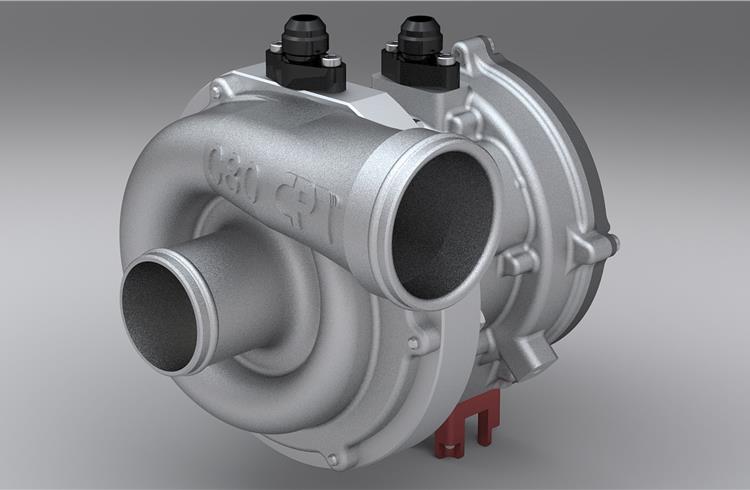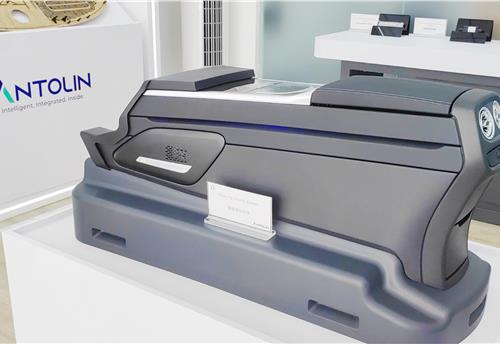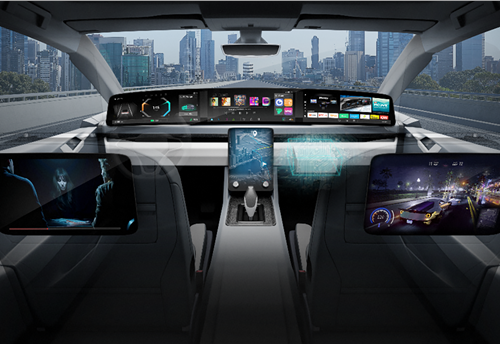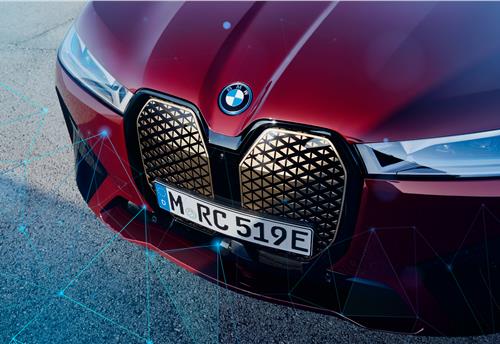CPT water-cooled electric supercharging reduces truck and bus NoX, particulate emissions
Controlled Power Technologies (CPT), an independent, clean-tech company, based in Germany, the UK and USA, will showcase its technically advanced range of COBRA (COntrolled Boosting for Rapid response Applications) electric superchargers
Controlled Power Technologies (CPT), an independent, clean-tech company, based in Germany, the UK and USA, will showcase its technically advanced range of COBRA (COntrolled Boosting for Rapid response Applications) electric superchargers – developed as an affordable hybrid system for heavy duty commercial vehicle applications, and designed to reduce their NOx and CO2 emissions – at the 19th Supercharging Conference being held in Dresden this week.
“CPT’s family of heavy duty compressors has been developed as original equipment for a wide range of diesel engines in off-highway and commercial vehicles using either 24V or 48V architecture in a low cost hybrid system,” says Nick Pascoe, chief executive, CPT. “COBRA builds on the experienced gained by commercialising our VTES electric supercharger for passenger cars. We sold our VTES business to Valeo in late 2011, and now focus on trucks and buses.”
“This key automotive industry event has increasingly recognised the advantages of an electrically driven compressor for improving the dynamic performance and efficiency of internal combustion engines, and the need to reconsider the overall design of the charging system as a consequence of the trend towards increased electrification of the powertrain.”
The conference will present a technical paper on electric supercharging from AVL, which has worked closely with CPT on the application of this up and coming boosting technology, as validated in the 48V LC Super Hybrid programme, primarily funded by the Advanced Lead-Acid Battery Consortium (ALABC), which demonstrates an air-cooled light duty version of the compressor in a large family saloon, powered by lead-carbon batteries. GM Powertrain and THY Engineering will similarly focus on electric supercharging in their technical papers.
“We are now applying CPT’s switched reluctance motor-generator technology to electric supercharging of large diesel engines,” says Andy Dickenson senior manager responsible for CPT’s TIGERS and COBRA technology. “COBRA can help reduce NOx and particulates as well as CO2 emissions, thereby moderating the need for expensive exhaust after treatment to meet Euro 6 requirements.”
“COBRA is beneficial in reducing diesel tailpipe emissions of urban buses and trucks with their continuous stop-start operation,” says Dirk Zepp, sales manager, CPT GmbH. “Another major environmental advantage of our switched reluctance technology is the elimination of permanent magnets in our electrical machines, which replace the need for expensive rare earth metals by using integrated electronic switching.”
Unlike mechanical superchargers, electric compressors are decoupled from the engine, which means air is delivered almost instantaneously – spinning up to 70,000rpm in less than half the reaction time of an F1 driver and in a fraction of the response time of a turbocharger – with a mass flow rate of up to 800kg/h. The result is more efficient combustion and torque delivered at low engine revs thereby improving the dynamic response of a downsized turbocharged engine, as well as reducing its fuel consumption by as much as 10 per cent. It’s an efficient way of using 2-9kW of stored electrical power. And depending on the rate of fuel injection, this can mean an additional 15-70bhp (20-90kW) at the crankshaft for up to 30 seconds.
“An electric compressor facilitates radical downsizing with fewer cylinders and smaller engine displacement,” says Pascoe. “That’s how we gain the extra fuel economy, but without compromising vehicle performance. It really does mean getting a quart out of a pint pot.”
Organised by the Automotive Technology Institute at the University of Dresden, details are available on the 19thSupercharging Conference and Controlled Power Technologies websites.
About Controlled Power Technologies
CPT is an independent, clean-tech company, based in Germany, the UK and USA,
RELATED ARTICLES
Antolin unveils sustainable tech solutions at Beijing Motor Show
In line with its China market roadmap, Antolin is showcasing its latest advances in lighting, HMI, electronics, and sust...
Visteon wins $1.4 billion in new business in Q1 2024, launches 26 new products
Digitisation of vehicle cockpit megatrend is a key growth driver for Visteon with over $400 million of displays wins; Vi...
BMW uses Catena-X ecosystem using real-world CO2 data to enhance quality
Working together with partners and suppliers, the company has modelled a complete data chain for the first time using re...





 25 Sep 2014
25 Sep 2014
 3806 Views
3806 Views





 Autocar Pro News Desk
Autocar Pro News Desk




